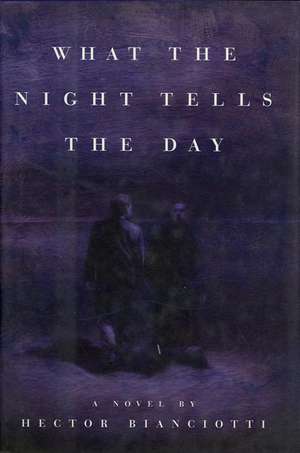The What the Night Tells the Day: Daily Meditations for Recovering Addicts
Autor Hector Bianciotti Traducere de Linda Coverdaleen Limba Engleză Paperback – 31 mar 1996
Compared to Conrad, Nabokov, and Beckett by Octavio Paz, Argentine-born Hector Bianciotti is one of the leading literary figures in his adopted homeland of France. What the Night Tells the Day, his first novel to be translated into English, is the fictionalized story of Bianciotti’s youth among poor immigrant peasants in rural Argentina during the late years of the Perón regime, and a moving and sensitive portrayal of a boy’s discovery of his own homosexuality.
Preț: 45.75 lei
Preț vechi: 56.22 lei
-19% Nou
Puncte Express: 69
Preț estimativ în valută:
8.76€ • 9.07$ • 7.31£
8.76€ • 9.07$ • 7.31£
Carte indisponibilă temporar
Doresc să fiu notificat când acest titlu va fi disponibil:
Se trimite...
Preluare comenzi: 021 569.72.76
Specificații
ISBN-13: 9781565842410
ISBN-10: 1565842413
Pagini: 272
Dimensiuni: 140 x 210 x 21 mm
Greutate: 0.34 kg
Ediția:Revised
Editura: New Press
Colecția The New Press
ISBN-10: 1565842413
Pagini: 272
Dimensiuni: 140 x 210 x 21 mm
Greutate: 0.34 kg
Ediția:Revised
Editura: New Press
Colecția The New Press
Notă biografică
Hector Bianciotti was born in 1930 in Argentina. He left for Europe in 1955 and has lived in Paris since 1961.The author of many books, including the prizewinning Sans la Miséricorde du Christ, he is currently the literary correspondent for Le Monde.
Textul de pe ultima copertă
In What the Night Tells the Day Bianciotti turns from the fiction for which he is widely known to what is in many senses a classic autobiography, a coming-of-age story in which the narrator gradually discovers his homosexuality. But Bianciotti takes this familiar theme and casts it in a narrative that surprises and enchants. It is written in the purest French classical style, marvelously translated by Linda Coverdale. What the Night Tells the Day chronicles Hector Bianciotti's youth among the poor Italian immigrant peasants of the most distant Pampas of rural Argentina, a culture as far from today's urban gay life as can be imagined. Sent away from home to a Catholic school, he suddenly and painfully unravels the secret of his own life and of those around him. The book ends with Bianciotti's departure for France, where he will become the distinguished writer and critic he is today.
